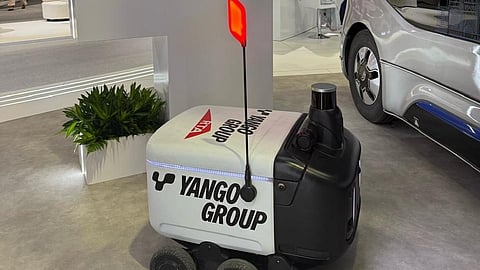Dubai Tests Tomorrow’s Couriers Today with Yango’s Autonomous Delivery Robots
Yango Group has accelerated its roll-out of last-mile autonomous delivery robots in Dubai this year, running simultaneous pilot programs that move the company from laboratory demos into real neighbourhoods and smart-city testbeds. So far, the robots have successfully traveled over 1,300 kilometers in Dubai without any human intervention.
The programmes, which include food delivery at Expo City Dubai and grocery drops in the Sobha Hartland community, form part of Yango’s broader push to embed robotics and AI into urban logistics across the UAE.
In May this year, Yango began a four-month pilot at Expo City Dubai that tasked AI-driven robots with delivering meals from selected cafés to staff and visitors around Al Wasl Plaza.
The machines navigate autonomously, plan routes, avoid obstacles and prioritise pedestrian safety, giving organisers a controlled environment to monitor performance, reliability and public interaction. The Expo trial is explicitly framed as a test of how robots can enhance convenience while supporting Dubai’s ambitions to be a global smart-city laboratory.
Parallel to the Expo City pilot, Yango has partnered with local food retailer ROOTS to deploy grocery-delivery robots in Sobha Hartland. The service launched earlier in the year under a licence issued by Dubai’s Roads and Transport Authority, has robots operating over short neighbourhood radii making deliveries within roughly 30 minutes and covering up to a two-kilometre service envelope in early runs.
ROOTS executives have described the initiative as a “game changer” for speed, sustainability and the customer experience.
Yango Tech Ecosystem
Beyond hardware, Yango positions the work as part of a wider AI and logistics ecosystem. The firm has consolidated autonomy, robotics and retail solutions under its Yango Tech umbrella by tying last-mile robots to warehouse automation, route optimisation and an app layer that integrates orders from partner stores.
That systems approach is important in dense urban contexts like Dubai, where regulators and operators emphasise safety, pedestrian priority and interoperability with existing city infrastructure.
Operational and Commercial Challenges
Still, questions remain about economics and integration. Analysts note last-mile robot programmes must prove cost competitiveness against couriers and gig riders, work within local weather and infrastructure constraints, and overcome consumer adoption barriers.
Yango’s staged approach, combining high-visibility pilots with licensed, neighbourhood operations, is intended to produce the empirical evidence needed to answer those commercial questions.
For now, Yango’s Dubai experiments offer a visible example of how autonomous delivery could be folded into a city’s logistics mix: low-speed, short-range robots handling frequent, small orders while larger deliveries remain with conventional vehicles.
If the pilots continue to deliver on speed, safety and cost, operators and municipal authorities say the next phase will be careful scaling across more communities, and deeper integration with retail partners.
As Dubai doubles down on smart-city innovation, Yango’s robots provide a live laboratory of technical, regulatory and behavioural lessons.
Whether autonomous couriers become a common sight on Dubai pavements will depend on the hard metrics emerging from these pilots - battery life, uptime, delivery costs and public acceptance - but the city’s current experiments make it clear that autonomous last-mile delivery has moved from concept to concrete trial in 2025.
Read More: Urban Delivery - The New Frontline for Retail Transformation


